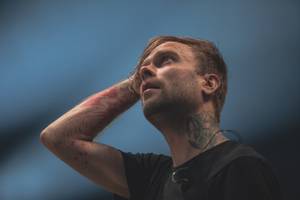The Drums are marching on. Even as the band has downsized from four members to one in the span of five years, frontman Jonny Pierce has kept his indie pop-parade going by fusing melodic, upbeat instrumentation with melancholy lyrics. He has written the majority of the band’s catalog, and he wrote and produced the entirety of latest effort Abysmal Thoughts. We spoke with Pierce about the critically acclaimed album, previous members of the band and his relationship with Las Vegas.
You just rocked Corona Capital Festival in Mexico. How was that? Incredibly powerful, encouraging and reaffirming. The people of Mexico, and Mexican-Americans in general, have really come through for this band, especially on this record. They’re honestly our biggest support group in the world, and it gives the strength that I need to get busy and make another record.
The Drums are sometimes compared to Morrissey and The Smiths—who are also huge in the Latin American community. One thing I’ve written about my entire life is inferiority. I’m very honest with how I feel. My songs are about insecurities. And Morrissey has this “woe is me,” underdog spirit that people see in themselves, and sort of latch onto.
How has being the last remaining member of The Drums affected writing and recording? I had a second coming-out. I came out as gay years ago, but now I’m coming out as the head songwriter of The Drums. I’m the guy who wrote almost everything you’ve heard from this band—from bass, guitar, synths, backing vocals … and if anyone has reservations about seeing The Drums in this iteration, come to the show. I want to put it out there that this is less about ego and more about comforting fans. It’s the same band.
About 95 percent of the Drums is me and myself. I’ve been quiet about that until now, and the reason is because I didn’t want people to think Jacob [Graham] and Connor [Hanwick] were doing the grunt work; I wanted them to feel involved every step of the way. I wanted them to get more credit, so they’d have more incentive to stick around. When Jacob left, I had complete control of the band.
How is your relationship with those two now? With Jacob, it’s been great. We’ve been pretty much brothers for 20 years, so it was definitely hard to see him go. But we still have a good relationship.
With Connor, it’s been a struggle. We tried getting together and having some fun, but it just didn’t have the magic that it used to have. That feeling’s been replaced by a sort of abstract bitterness that goes both ways. We spent a sh*tload of time together, so I guess you can say we reached our quota.
There’s no real rulebook or set of guidelines for doing this. You just throw four guys together and hope it works. Sometimes it does, sometimes it doesn’t. At first, I was a little bit scared that every aspect of the band would fall apart, but I quickly learned that it was a gift. I was finally able to step into who I am as an artist. Leading up to that, I felt like I was doing everything with one hand tied behind my back.
Lyrically, The Drums has been most of what I wanted it to be, but not all of it. I like writing about some touchy themes—sex, being depressed and suicidal—lyrics that are based on my reality. It’s all hyper-personal, and super transparent. I lost Jacob, but two months before that, I lost my husband. It was a massive tour de force of loss—I lost the two people I clung onto, but it gave me plenty of material. It seems like every time I record, I’ve been marred with crisis. I guess you can say I’m lucky on one hand, but it would be nice to stop dealing with that soon.
I’ve noticed that there’s a stark contrast in Abysmal Thoughts where major, upbeat music is juxtaposed with dark lyrics. Why choose to do that? I’ve made a rule for myself: Do what comes naturally. Before I sit to write, I spend a lot of time preparing myself. I sit in my chair, slump my shoulders, take deep breaths and take everything in. It’s a physical release, but I’m mentally letting go of everything, too. It puts me in a place to listen to my heart or creative mind—getting in touch with where I am, who I am and what I am.
But yes, it just so happens that there’s always a danceable beat—a backbone that I can’t shake. [When writing music] I almost always use the white keys. I rarely write anything minor. I’m just trained to do things that way. It’s easier to piece pop songs with major chords and pepper those depressing bits in the lyrics.
The Drums seem to have a huge, consistent Vegas crowd. Why do you think your music resonates so much with this city? Vegas has this kind of scrappiness and community element. I played an in-store at Zia Records, and I thought that was dope. I’m happy that it’s still there and still hosting these kinds of events.
I still don’t think we’ve played a show as crazy as the time we played Hard Rock Live on the Strip. It was insanity; at least five people were crowdsurfing for the entire set. I remember we were onstage looking each other, saying, “What the f*ck is happening?” That was the beginning of a lovely relationship between The Drums and Las Vegas.
Given the tragic events of October 1, do you have any reservations about playing in Las Vegas? Not at all. I’m no hero. The real heroes are the people who helped that night and the people who continue to thrive in the city. If my music helps people get a release, then I’m right there with you. The people are heroic. I’m just here to help.
The Drums With Hoops. December 14, 7:30 p.m., $17-$20, all-ages. Brooklyn Bowl, 702-862-2695.







